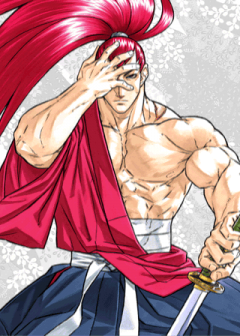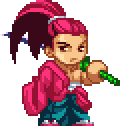-The Dream Cancel Wiki has successfully upgraded it's wiki software and editing has returned. Tables for data have returned.
Samurai Shodown VI/Genjuro

Introduction
Genjuro here is a downgrade from his V Special iteration, notably losing his universal overhead in neutral and command grab special in mixups while also being affected badly by universal damage nerfs. You still have card setplay, which may at first appear ruined by short and long rolls but 646A grants him his only hard knockdown which guarantees his setplay. Every combo Genjuro does must end in 646A to ensure his card setup remains supreme. Genjuro may have received nerfs but he is one of the few characters in the game to not only bypass tech rolls but also have a great enough run speed alongside this tech immunity to chase tech when needed
Data
- Dash type: Run
- Damage taken: 100%
- Rage retention: 210
- Rage duration: 8 seconds
Gameplan
Genjuro is typically played aggressively, finding opportunities to set up card bounces and rekka crossups in their face. However, he also has tools to play neutral reasonably well. His 5B has good priority, while his 2B is a low with the same range which can't be deflected. 5C has particularly long reach for punishes, can catch backdashes and has a kara cancel window at the start. All of these tools recoil cancel, which Genjuro has appropriate tools for - countering punish attempts with DP (623S) or a high-priority hitgrab (646S), going for a mixup (236S) or setting up card (214S) are all viable options. 623A may be used as an occasional poke for its high priority. Given the removal of universal overheads, Genjuro no longer has the option to hop over lows with one, so keep that in mind.
If you get your opponent to block 214S and you're holding down the button, the card will bounce then fall as an overhead. This is often combined with lows such as 66B for near unblockables. New to VI is 421S, a low with juggle potential, which you can use to make these situations more rewarding. An easy option for the opponent to escape this trap is to simply backdash away, which can be countered by poking with something far-reaching like 5C instead of going for a low. A flaw with Genjuro's card game in VI is that it is difficult to loop due to the changes made to wakeup rolls. While the opponent's short rolls have some strike vulnerability at the end which you can take advantage of, long rolls do not but leave them closer to the corner. The opponent escaping your trap in this way is something you'll have to worry about less if you have them cornered, where you also have access to a more-rewarding 421S which there can juggle into WFT. Another thing to keep in mind is the removal of your three-hit kick and command grab from earlier games.
Given Genjuro's aggressive playstyle, short Rage retention and even shorter Rage duration, VI is a viable Spirit choice so you have access to WFT more often. Given Genjuro's short rage time and limited usefulness for WFT you may choose V Spirit instead to meditate your rage away, and while it can be Rage Exploded on the first hit you still have a launcher in the form of 421S. Unfortunately, you don't get an extra visual effect after Issen anymore.
Normal Moves
Far Slashes
- 5A - Quick sword flick.
- 5B - Average medium slash length but with priority that beats spaced attacks.
- 5C - Long ranged punish which can catch backdashes. Useful for your card setplay. Kara cancellable.
- 2A - Crouching n5A.
- 2B - Low hit with 5B's range. Immune to 236E.
- 2C - Crouching 5C but you can't cancel the startup. Slightly faster though.
Near Slashes
- n5A - Short jab. You can still tick into your regular throw.
- n5B - Standard combo tool.
- n5C - Upward swing for punishes. Not an effective anti-air.
- n2A - Same as far version.
- n2B - Crouching n5B but more active.
- n2C - Crouching n5C but it ends quicker, allowing you to link something afterwards.
Kicks
- 5D - No more three-hitter for you. This is just the ranged kick at the end. Special cancellable.
- 6D - Standing low. Genjuro stomps at the opponent's feet. Doesn't knock down or cancel into specials.
- 2D - Short low kick. Special cancellable.
- 3D - Basic sweep which sticks out for a while.
Dash Normals
- 66A - Stubby elbow with bad frame data. Punishable on hit.
- 66B - The first hit is a low slash, while the second hit knocks down. Often used in card setplay for its speed and the fact you want to get in anyway.
- 66C - Running 5C, with aided reach thanks to some of the momentum carrying over. Best used as a punish tool and for (crossunder) anti-airs.
- 66D - Running sweep, but it hits mid. Safe on block.
Air Normals
- jA - Downward punch.
- jB - Air-to-air. Reaches farther than jD.
- njC - Downward swing with noticeable delay to it.
- jC - Short-ranged diagonal sword swing. Has plenty of hitstun so you can link into your close mediums easily without a deephit.
- jD - Air-to-air. Looks similar to 3D.
Unarmed Normals
- u5S - Short punch.
- u2S - Low hook.
- u66S - Running u2S which knocks down.
- juS - Same as jA.
Hyper Slash (I)
- A+B - Essentially his 5C. One of the hardest-hitting Hyper Slashes in the game, which is particularly scary when combined with 5C's range.
Special Moves
Lightning Wings - 623S
- Genjuro's DP. Strength determines how high it travels, also the horizontal distance to a much smaller extent than in V Special. All versions will hit a grounded opponent and have decent upper body invincibility. The light version is worth exploiting for its priority.
Triple Death Hack - 236S, can be repeated twice in either direction (Samurai Drive)
- Rekkas. Strength determines how far Genjuro travels before the hit, with the light version coming out immediately and the medium and heavy versions being able to crossover. The first and second hits will crossover, but the final hit will always be the same finisher but delayed depending on strength. Great for close range pressure. You shouldn't use this in neutral because the opponent can just jump instead of worrying about which way to block, but you'll do it anyway because you are a scrub.
- If you are running II or V Spirit you can duck the second hit after blocking the first to avoid it. This is particularly effective if they go for the medium version, as if they follow up with the light version they can delay the final hit to punish you. If they don't follow up with anything then you will get punished. You can also just abare out if you expect the crossup but this is even riskier.
- Despite the changes made to the corner you are still unable to crossover a cornered opponent with any part of the rekka.
Cherry Blossom Slice - 214S
- Genjuro's fireball. Strength determines startup and range. Advantageous enough on hit to follow up with a medium slash, 236A or something else quick, and pretty safe on block. Given the startup it's not something that will win you fireball wars.
Cherry Blossom Slice Splash Raising - hold down S, will activate if guarded
- If the opponent blocked the card and you were holding the button down the whole time, the card will bounce up then fall down for an overhead hit. Strength of the card beforehand also determines how far forward the bounced card will fly, in which 214A/B are useful for setplay but 214C will catch a backdash. You're better off catching backdashes with 5C while going for 214A/B, however. It is harder to set up card setplay in VI given wakeup rolls act more like quick rises, and furthermore there are two distances of back rolls to worry about.
- This game has unblockable prevention, so if 214[S] hits at the exact same time as a low attack (e.g. 66B) your opponent will be able to block both hits (at least if they are blocking high, from testing). It is better then to go for near-unblockables rather than to time the actual 'unblockable'.
- For whatever reason, this won't activate if the screen is zoomed out even a little.
Slash Of A Hundred Demons - 646S
- Hitgrab with a disjointed hitbox, making it useful for beating other pokes. Strength determines the startup, activity and how far Genjuro moves forward. It has received a new input meaning you won't get this by accident instead of 214S. Has decent chip potential.
Rush Slash - 421S
- Instead, you'll get this. After a brief pause Genjuro runs, strikes the opponent's knees then launches them upward. This hits low and allows for juggle combos - you will be able to follow up with a DP at most ranges, but in the corner you can juggle with 646A or your WFT. Strength determines how far Genjuro runs before the strike, with A version not running at all. The purpose of this move is to make Genjuro's near-unblockable card game more rewarding damage-wise, particularly in the corner.
Toy Transformation - 6321464E (II)
Supers
Five Flash Rip - 236AB
- Fast WFT with upper body invincibility. Has decent priority and can be combo'd into by plenty of things. This move gives you a hard knockdown and maximum spacing for 214B, but you do not recover in time to land it meaty.
Lightning Wings Demon Slash - 632146BC (II), 236BC (VI)
- Similar to Genjuro's EX DP in other games and with similar applications. Either anti-air with it, use it as a reversal or combo into it for big damage.
Combos
Standard Combos
- n5B/n2B/5D 623S/236A/646A/421A/236AB - Basic special cancels.
- n2C, 2D 623A - Conversion from low kick.
- n2C, n5B/n2B/5D 236A/646A/421A - Corner only. Same link from n2C but you're pushed back too far to combo into DP or WFT. Given this is dependent on proximity the close medium confirms will not work on some characters.
- 421S 623S - Anywhere juggle from 421S.
- 421S 646A/236AB - Corner juggles from 421S.
Continuous Slash (IV)
- A+B BBC 623S - Standard BBC juggle.
- A+B BBC 236AB - Corner only.
State Of Nothingness (V)
- 421A, n2C ABC - Possible launcher combo with the bare minimum amount of time you can have. May drop n2C if time is short. With more time you can fit in repeated njC hits and Issen will still connect.

